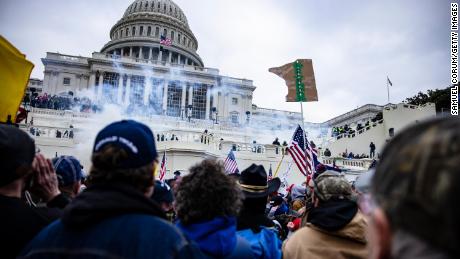Clark’s testimony could be a major step forward for Democrats as they attempt to determine what former President Donald Trump, Republican members of Congress and his advisers did and said behind closed doors about overturning the results of the 2020 election before January 6.
CNN has also learned that Alyssa Farah, former director of strategic communications in the Trump White House and assistant to the president, has voluntarily met with Republicans on the House select committee and provided information in several meetings, according sources familiar with the matter. There are two Republicans on the committee — Vice Chair Liz Cheney and Rep. Adam Kinzinger.
The panel has been talking to an ever-widening circle of witnesses as part of its sprawling investigation — and testimony from Farah in addition to Clark would give the panel a crucial new level of insight into Trump’s thinking after the election.
The select committee declined to comment about witness testimony.
Farah resigned from her role as White House communications director in December 2020, one month after the election. At the time, she said it was “the honor of a lifetime to serve in the Trump administration.”
After the deadly January 6 insurrection, Farah told CNN that Trump lied to the American people about the 2020 presidential election results and said that he should “seriously consider” resigning from office.
Clark emerged in the last week of 2020 as a central player in Trump’s two-month-long effort to overturn the vote in key states — and as one of the officials who was in direct contact with Trump.
While serving as the acting head of civil cases at the Justice Department at the end of the Trump presidency, Clark floated plans to give Georgia’s legislature and other states backing to undermine the popular vote results. He gave credence to unfounded conspiracy theories of voter fraud, according to documents from the Justice Department, and communicated with Trump about becoming the attorney general, a Senate investigation found this month.
The extent of Clark’s talks with Trump in the days before January 6 aren’t yet publicly known. The committee subpoenaed Clark for testimony and documents last week.
The committee has already spoken to two superiors of Clark at DOJ, former acting attorney general Jeffrey Rosen and former acting Deputy Attorney Richard Donoghue, who told Trump that if he installed Clark as attorney general as a way to overturn the election of Joe Biden, many DOJ officials would resign.
Both men already have confirmed Clark’s push inside the Justice Department to give Trump cover to spread election lies, and his efforts to elevate himself into the top job as Congress’ certification of the election neared.
The Senate Judiciary Committee, led by Democrats, slammed Clark in its 400-page report on the attempted coup of the election and asked for a DC Bar review of his professionalism as a lawyer. Democrats who run the committee did not have Republican support for a subpoena, and Clark did not speak to them.
Both the Senate Judiciary report and the House select committee investigating January 6 have highlighted that there are still unanswered questions about lawyers and members of Congress around the former President, their conversations with Clark and discussions about how the Justice Department could help Trump.
Some of the House committee’s inquiries are focused on US House Rep. Scott Perry, a Pennsylvania Republican, who introduced Clark to Trump.






